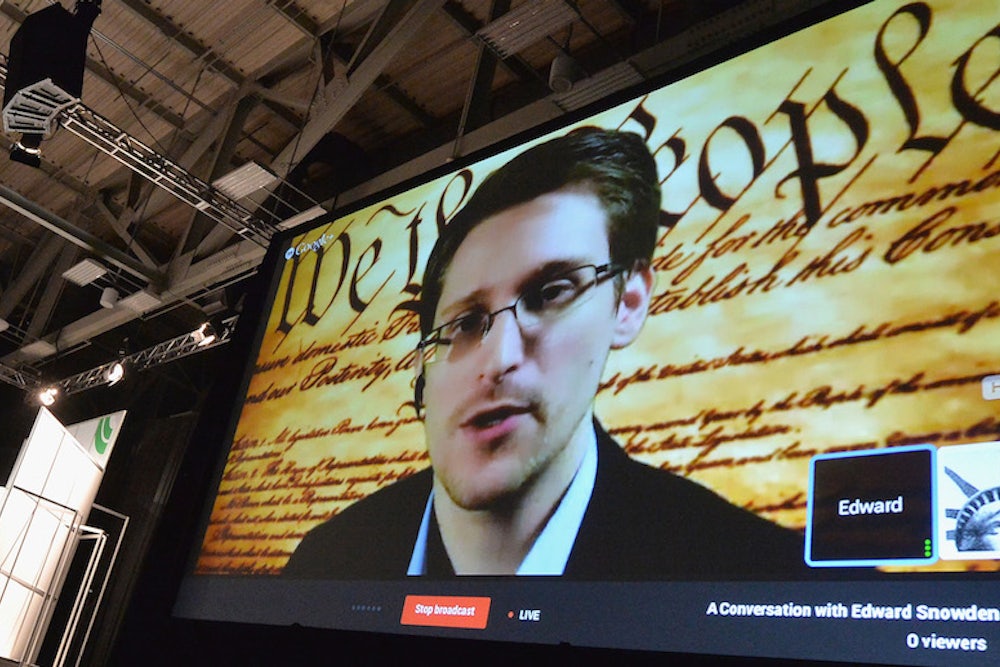To say that Edward Snowden’s teleconference at South By Southwest this morning was an interview would be something of a stretch. He was beamed in from Russia to field questions from two ACLU activists in front of a roomful of tech-enthusiast SXSW attendees. His face was superimposed over a green screen of the Constitution, and the talk was peppered with quips for journalists and advertisements for Snowden’s cause: People working on encryption are practicing “Defense Against the Dark Arts for the digital realm.” The NSA is “setting fire to the future of the Internet,” he told the crowd. “The people that are in the room now, you guys are all the firefighters.”
He went over his usual talking points—that the US needs “a watchdog that watches Congress,” that Google, Apple and their ilk are essentially “advertising companies” looking to capitalize on data. Snowden argued that the technology community needed to make sure that internet security could “pass the Glenn Greenwald test”—that is, be more accessible for people who don’t specialize in tech. This was the main criticism he or his moderators addressed: that the encryption technology was imperfect, that it needed improvement to get the public on board, that with enough innovation data could be easier to protect. Certainly the technology does need improvement. But that’s an insiders’ issue—and one that ignores the broader ethical questions that have arisen around Snowden. The focus on it bespeaks a disconnection from the public that Snowden’s supporters will have to learn how to grapple with if they want internet privacy to be anything other than a fringe issue.
For the panel’s participants, privacy advocates had failed most grievously by not making encryption technology more accessible to average users. When one Twitter watcher asked what average users could do to make their data more secure, Snowden answered by giving a brief explanation of Tor, the data-encrypting software. Ben Wizner, Snowden’s lawyer and a co-moderator of the event, elaborated: “When there’s a question about average users, and the answer is Tor, we’ve failed.”
It’s not that this sort of softball interview is inherently a bad thing—and SXSW attendees are about as sympathetic an audience as Snowden is going to get. But in a conversation centered on technologists’ need to make their concerns more accessible to the public, neither Snowden or his moderators bothered to address the concerns of most of that public—only 31 percent of whom, according to a January poll conducted by CBS, approve of Snowden’s whistleblowing. The idea that the most serious issue for technologists to address is Tor’s usability is laughable—certainly that’s not the primary concern of the other 69 percent.
From such a public venue as SXSW—more than 40,000 were watching the livestream at peak viewership—it makes sense for Snowden to address the criticisms levied towards him, like that he’s advocating for free speech from Russia, or that he’s done more harm to public security than good. These criticisms, common in public discussion of Snowden, barely came up in the interview. That’s not doing anyone any good.
“Let me be clear about one thing,” Chris Soghoian, an ACLU activist and the panel’s other moderator told the crowd midway through the interview, “Ed’s disclosures have improved internet security.” The SXSW audience applauded wildly. But to put it bluntly, internet security is too abstract a concern to galvanize the general public—questions like “If I’m not doing anything wrong, why do I care if the NSA watches?” and “How do I know the NSA is actually collecting my data?” abound, and it’s difficult to rally people against an invisible collections system and secret courts when there are countless more tangible issues in the press ever day. Snowden and his advocates have addressed these concerns, arguing, for example, that even White House investigations have found PRISM ineffective, or that focusing on offensive collection takes away from defensive resources. But they haven’t found a way to convince the broader public that this issue has relevance for them. When internet privacy advocates talk about “accessibility,” they shouldn’t just be thinking of how to make Tor easier to use—but rather how to frame spying in more concrete terms. It’s excellent that Edward Snowden is finding ways to make public appearances not mediated by journalists in interviews—that’s one good step towards humanizing his cause. The next is for him to start tackling more difficult questions head on.
